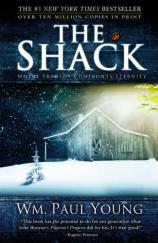The Shack
Review
The Shack
THE SHACK is the kind of book that drives long-time authors crazy. Right out of the chute, first-time novelist William P. Young has a bestseller on his hands, with some two million copies in print. Even more maddening are two specific factors: one, the first million copies were self-published, unevenly written and poorly edited; and two, the story bears the marks of questionable theology.
And yet, at least some of those envious authors and theological critics have to admit that there's a lot to like about this publishing phenomenon, and there's a reason ---- or really, many reasons --- why this book is so popular. But first, to the story itself. This is in part an allegorical novel, which is important to keep in mind as you read the book and any review of it.
Mackenzie Allen Phillips's youngest child, Missy, is abducted during a camping trip in Oregon, and evidence found in an abandoned shack some time later leads authorities to suspect that she has fallen victim to a serial child abductor and killer. Over the ensuing years, Mack, his wife and his surviving children attempt to get on with their lives, with varying degrees of success --- or, in some cases, failure. And then, one day Mack receives a letter that had not been mailed but was placed in his mailbox. The letter provides details that no one could possibly know --- no one but God, that is. And the sender asks Mack to meet him (the letter is signed "Papa") at the very shack where Missy likely lost her life.
When Mack arrives at the shack, however, everything changes. His world turns upside down, as the shack becomes a welcoming, cozy cabin, the landscape takes on an entirely different look and the occupants of the cabin --- well, let's just say that if you don't already know this part of the story, I'll let you be surprised. This is where the allegory kicks in and where understanding the nature of that literary form is essential to fully appreciating the story. To take this portion at face value and then attempt to apply a dogmatic biblical perspective to it is to misunderstand the book completely.
At any rate, Mack remains at the cabin long enough for God to answer the myriad questions he has about his daughter's death --- some emotional, many relational, most theological. The answers don't necessarily come quickly or easily, and some don't square with much of evangelical biblical interpretation. Or maybe they do, depending on your interpretation of evangelical biblical interpretation. We're getting into deep theological waters here.
So what is it about THE SHACK that created all of that word-of-mouth buzz? First off, it's a compelling story of an anguished father trying to make sense of a moment in time that changed so many lives forever. Second, the book presents an image of God that some readers --- with the emphasis on some --- will find more accessible than whatever image they have in their heads right now. Finally, the novel offers hope to many who have faced unimaginable loss and are left with a truckload of questions about who God is and how God can allow so much heartache and tragedy to exist.
For those readers, the story itself will no doubt overshadow the theological problems and the uneven quality of the writing, which shines at times and falls flat at others. In fact, the writing changes so dramatically when Mack reaches the shack-turned-cabin that it's as if Young wrote that section at an entirely different time from the rest of the novel. The previously poignant story takes on the tone of a rollicking romp through an alternate universe, with Young simply providing the narration.
Biblical literalists will find little to like here. But if you understand allegory and don't have a problem with an open-minded exploration of the nature of God, you'll discover plenty of food for thought in THE SHACK.
Reviewed by Marcia Ford (misfit@marciaford.com) on January 23, 2011





